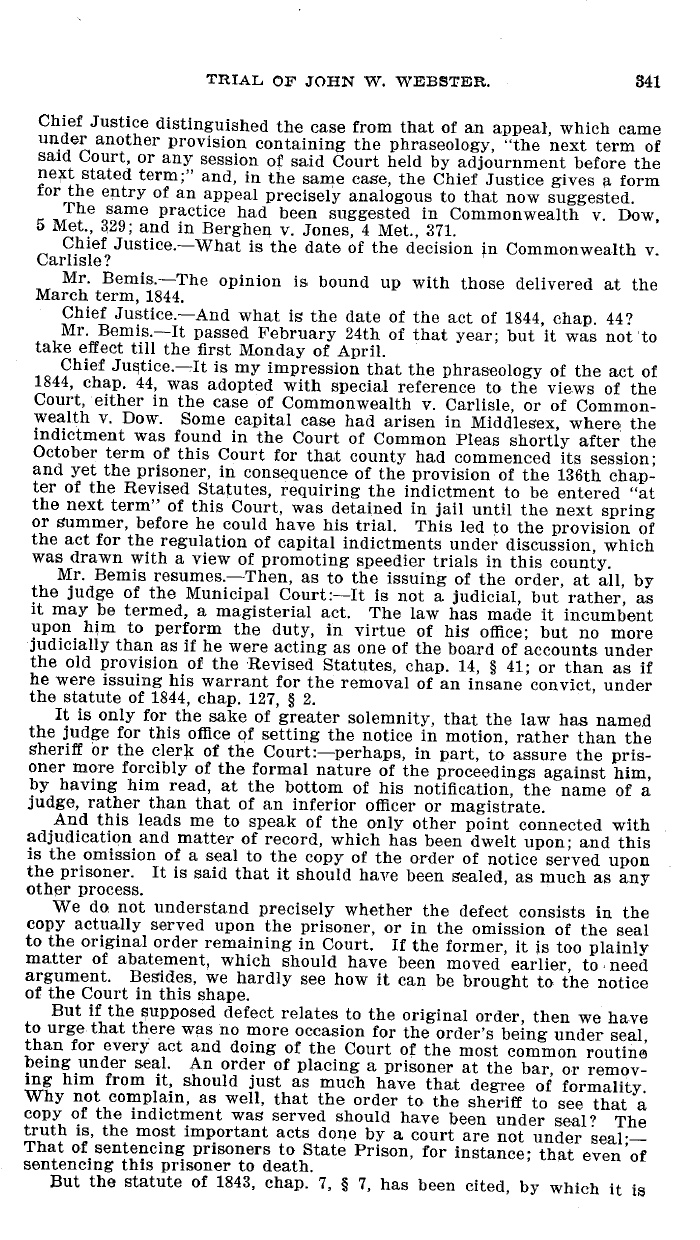|
TRIAL OF JOHN W. WEBSTER. 1341
Chief Justice distinguished the case from that of an appeal, which came
under another provision containing the phraseology, "the next term of
said Court or any session of said Court held by adjournment before the
next stated term;" and, in the same case, the Chief Justice gives a form
for the entry of an appeal precisely analogous to that now suggested.
The same practice had been suggested in Commonwealth v. Dow,
5 Met., 329; and in Berghen v. Jones, 4 Met., 371.
Chief Justice.-What is the date of the decision in Commonwealth v.
Carlisle?
Mr. Bemis.-The opinion is bound up with those delivered at the
March term, 1844.
Chief Justice.-And what is the date of the act of 1844, chap. 44?
Mr. Bemis.-It passed February 24th of that year; but it was not 'to
take effect till the first Monday of April.
Chief Juptice.-It is my impression that the phraseology of the act of
1844, chap. 44, was adopted with special reference to the views of the
Court either in the case of Commonwealth v. Carlisle, or of Common-
wealth v. Dow. Some capital case had arisen in Middlesex, where the
indictment was found in the Court of Common Pleas shortly after the
October term of this Court for that county had commenced its session;
and yet the prisoner, in consequence of the provision of the 136th chap-
ter of the Revised Statutes, requiring the indictment to be entered "at
the next term" of this Court was detained in jail until the next spring
or summer, before he could have his trial. This led to the provision of
the act for the regulation of capital indictments under discussion, which
was drawn with a view of promoting speedier trials in this county.
Mr. Bemis resumes.-Then as to the issuing of the order, at all, by
the judge of the Municipal Court:-It is not a judicial, but rather, as
it may be termed, a magisterial act. The law has made it incumbent
upon him to perform the duty, in virtue of his office; but no more
judicially than as if he were acting as one of the board of accounts under
the old provision of the Revised Statutes, chap. 14, § 41; or than as if
he were issuing his warrant for the removal of an insane convict, under
the statute of 1844, chap. 127, § 2.
It is only for the sake of greater solemnity, that the law has named
the judge for this office of setting the notice in motion, rather than the
sheriff or the clerk of the Court:-perhaps, in part, to assure the pris-
oner more forcibly of the formal nature of the proceedings against him,
by having him read at the bottom of his notification, the name of a
judge, rather than that of an inferior officer or magistrate.
And this leads me to speak of the only other point connected with
adjudication and matter of record, which has been dwelt upon; and this
is the omission of a seal to the copy of the order of notice served upon
the prisoner. It is said that it should have been sealed, as much as any
other process.
We do not understand precisely whether the defect consists in the
copy actually served upon the prisoner, or in the omission of the seal
to the original order remaining in Court. If the former, it is too plainly
matter of abatement, which should have been moved earlier, to need
argument. Besides, we hardly see how it can be brought to the notice
of the Court in this shape.
But if the supposed defect relates to the original order, then we have
to urge that there was no more occasion for the order's being under seal,
than for every act and doing of the Court of the most common routine
being under seal. An order of placing a prisoner at the bar, or remov-
ing him from it, should just as much have that degree of formality.
Why not complain, as well, that the order to the sheriff to see that a
copy of the indictment was served should have been under seal? The
truth is, the most important acts done by a court are not under seal;
That of sentencing prisoners to State Prison, for instance; that even of
sentencing this prisoner to death.
But the statute of 1843, chap. 7, § 7, has been cited, by which it is
|

